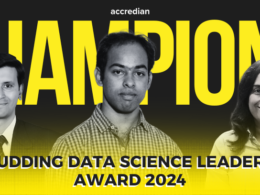Arijit Chakrabarti has 19 years of illustrious experience in media and advertising. And while working in various prestigious media houses, he understood the importance of data science and machine learning to optimize not just marketing and sales but operations. So, wanting to have in-depth knowledge on data science, Arijit looked for the best machine learning course and enrolled for the Global Certificate in Data Science & AI (GCDAI) program at Accredian.
In this interview, let’s take a look at how Arijit plans to implement data science in his current scope of work and how his experience has been at Accredian
Question 1: Which program & batch are you part of at Accredian & tell us more about your current work profile?
Arijit: I am part of the Global Certificate in Data Science & AI (GCDAI) program, March 2020 cohort. I am the Associate Vice President at GroupM, the world’s largest advertising agency. I head strategy and creative for the out-of-home and cinema practice.
Out of sheer passion, I create tools for the organization to optimize efficiency. My platform of choice is Power BI which I recently used to create a tool called India On The Move as part of one of my projects at Accredian.
I use this tool to strategically position and understand how audience mobility has changed due to COVID 19. The tool has got tremendous organizational value which has led our company to get 22 new clients on board.
I am also a published author, and regularly give my inputs on multiple forums such as Exchange4Media, talking about various upcoming trends, etc. I put my regular postings on LinkedIn as well.
Question 2: Walk us through your career journey & what got you interested in Data Science & Machine Learning?
Arijit: I firmly believe that data is intrinsic to all business decisions. And I say this after experiencing the magnitude of its impact throughout my career. I started my career in corporate strategy at Bennett, Coleman and Company Ltd., also known as The Times Group. The work there was heavily data driven and analytical.
Throughout my career I have worked in diverse projects, including projects on remnant advertising where by leveraging data we analyzed the average sizes of newspaper advertisements. We also heavily relied on operations, sales and marketing data for the publication and optimal monetization of color newspapers.
Fast forwarding to 2009, when I started working at Madison Outdoor Media Solutions, I transformed the conventional pictorial client pitch presentations into insightful ones through rich data insights to which the response from multiple clients were really positive.
My interest for data science heightened even more when in 2015 I was sent to DDB University to learn marketing analytics by my then organization DDB Mudra Group. Then in 2019, GroupM sent me to Mumbai for a course in Power BI to leverage data further.
When I came back, I created three tools for the organization that helped the entire client servicing team to directly extract, manipulate, and demonstrate data to clients. I call this the democratization of data which can be driven across the entire organization. And, I feel proud and extremely happy that they use the tools even today. After being so interested in data science and machine learning, I finally enrolled for the best machine learning course at Accredian.
Question 3: What all tools and packages in Data Science & Machine Learning have you mastered in your Data Science & AI program at Accredian so far?
Arijit: Being from a sales and marketing background, my knowledge of coding was negligible. I learnt the basic beginners all purpose symbolic instruction code when I was in school. But that was it. My understanding of statistics was also rather rudimentary.
So, I had to pay extra attention to learn Python from ground up. My projects have significantly helped me improve my understanding of the various libraries.
Right now, I am quite confident that Accredian offers the best machine learning course because in such short time, I have a fair understanding of various Python libraries like NumPy, Pandas, Seaborn, Matplotlib and have learned multiple different machine learning algorithms. I am also quite confident in K nearest neighbors, principal component analysis, SVM, and various other modeling techniques.
Question 4: What were some of the initial challenges when you got started on your Data Science journey and how did you overcome it?
Arijit: My journey with data science began much prior to my association with Accredian. However, my concern has always been that even when data is available, it is not fully utilized. So, my objective was to leverage data science to have a clear evaluation and understanding of the overall landscape and overall client proposition.
I have started using various packages such as TGI (Target Group Index), IRS (Indian Readership Survey), and managed to repurpose them. I also extract data through archive swarming for marketing plans so that they are based on audiences and the value derived by our clients via ads.
To optimize this method, in 2017, I have also developed and launched a global planning platform, Aureus, in my current organization. It is customized for India whose second version was launched in 2019. The platform offers end-to-end solutions, from briefing to final output, in the form of Excel and PPT.
Question 5: Who is your favorite faculty at Accredian and what did you learn from him the Most?
Arijit: It is extremely difficult to name a single favorite faculty at Accredian. Each of the faculty members at Accredian bring a separate group of skill sets to the table and that’s why it has the best machine learning course. And this is what I, as a student, am able to learn from them. However, if I were to pick names, there are two faculty members whom I would like to name and one is Deepesh and the other is Suchit.
Suchit has extreme mastery over teaching. He is very confident and clear in his teaching methods. In fact, he is the one who encouraged me to learn Python. During one of the classes, where he individually coached me to understand Gaussian Distribution, he said to the others that if I, coming from a non-programming background, can understand it, then it’s expected that others with a programming background can grasp it even better.
Deepesh shines in his capability to explain underlying concepts. He has taught me a lot of difficult concepts. Rather than focusing on coding, he emphasizes and explains the reasons for the output meticulously which has helped me a lot in both understanding and practicing the concepts.
Also it is interesting to see the difference in the teaching styles of Suchit and Deepesh. I remember particularly, during the foundation segment, Suchit clearly forbade us from using Excel as may be he wanted us to shift from Excel to Pandas in Python. However, Deepesh doesn’t have any qualms about using any method or tool to get the job done. We did a lot of work in Excel as well which I can better relate to as in my whole career I majorly used Excel for data.
Question 6: What is the goal of Data Science?
Arijit: Data is created every second of our existence. It is a fertile source of insight that can be used for forecasting to avoid business risks and mishaps like availability or quality of research resources. Predictive analytics can also be used in marketing to identify target audience, analyze audience behavior and determine marketing budget.
Today, data is the new oil that runs all industries. The goal of data science is to become a multi-disciplinary practice in which the objective of data scientists should be to administer a unified application of its various concepts to drive business profitability.
I would also like to point out that ethics play a critical role in data science. We all know how data has been misused across businesses, and we should strive to ensure there is no individually identifiable data used for targeting.
On a macroscopic level, the objective of data science is to optimize every activity in every single department. I feel we can use concepts like regression analysis in HR to evaluate the suitability of a candidate in an organization.
Power BI also allows the organization to understand the real-time scenarios and issues in business and take corrective action. Although previously these dashboards were manually created, but through automation, I have been able to ensure that once it’s created online – the required person can now download the data with a click of a mouse, and retrieve the entire gamut of insights within a couple of seconds.
Question 7: In your view, how has Data Science evolved in the last few years?
Arijit: Data science has been the purview of a privileged few who had access to the data and the tools for data analysis. But with the diversity of incoming data sources, it is extremely critical that data and its analysis be democratized. Its analysis and insights should be simplified in a manner where it is now more useful to the larger gamut of people within the organization.
This can be through the simple use of code, be it based on Python, C or C++ or as simply as it being exploited through Excel, considering the power that it has. Hence, the complexity of the analysis of data has reduced over the last few years and there is a possibility of further simplification and democratization taking place.
Question 8: What are the current trends in Data Science that you are most excited about?
Arijit: One of the current trends that I feel has significant value is automation in machine learning. Gone are the days when machine learning required complicated understanding of code and its application to be able to use it. Auto ML, I believe, will ensure the democratization of data that I have been speaking of earlier.
I have used various auto ML tools such as TeaPOT, HyperoPT, PyCaret, Facebook Prophet, and others. The similarity between all these different auto ML libraries is that they simplify the output extensively. Considering the pressures of profitability and deliverability, it is critical to enable a workable output and move on.
It may not be the most optimal solution possible, but in today’s fast paced decision making requirements, it is essential that management takes decisions based on adequate data rather than spending time to figure out the perfect data for taking a decision.
Question 9: Which are some of the blogs that you follow?
Arijit: The data science space is constantly evolving. As a practitioner of data science, it is critical for me to keep myself updated of all the latest developments in this field.
One of the best ways to do that is to be associated with news. I have added Google News alerts on data science keywords. And this kind of gives me very clear snippets of what has been going on in the past few days as well as the latest developments.
As far as blogs are concerned, I consider data science blogs on Reddit, KDnuggets, DataCamp as well as Datascience 101.
Question 10: What is your advice to anyone wanting to start a career in Data Science?
Arijit: Since I come from a non-programming background, it was extremely difficult at the beginning of my data science journey. So, for anyone with a similar background, I would say expect to put in significant effort and choose the best machine learning course for yourself so that you get brilliant faculties as in Accredian.
Have a clear understanding of the basic concepts and statistics. Make sure you are practicing coding daily. Some coding snippets may not work instantly but don’t stop believing in yourself. You will gradually get there. Keep trying cause you will feel an unparalleled gush of joy when a code snippet finally works.
This was a conversation with one of our GCDAI students – Arijit Chakrabarti.
If you want to read more such interesting student interviews, go to Accredian Spotlight.





